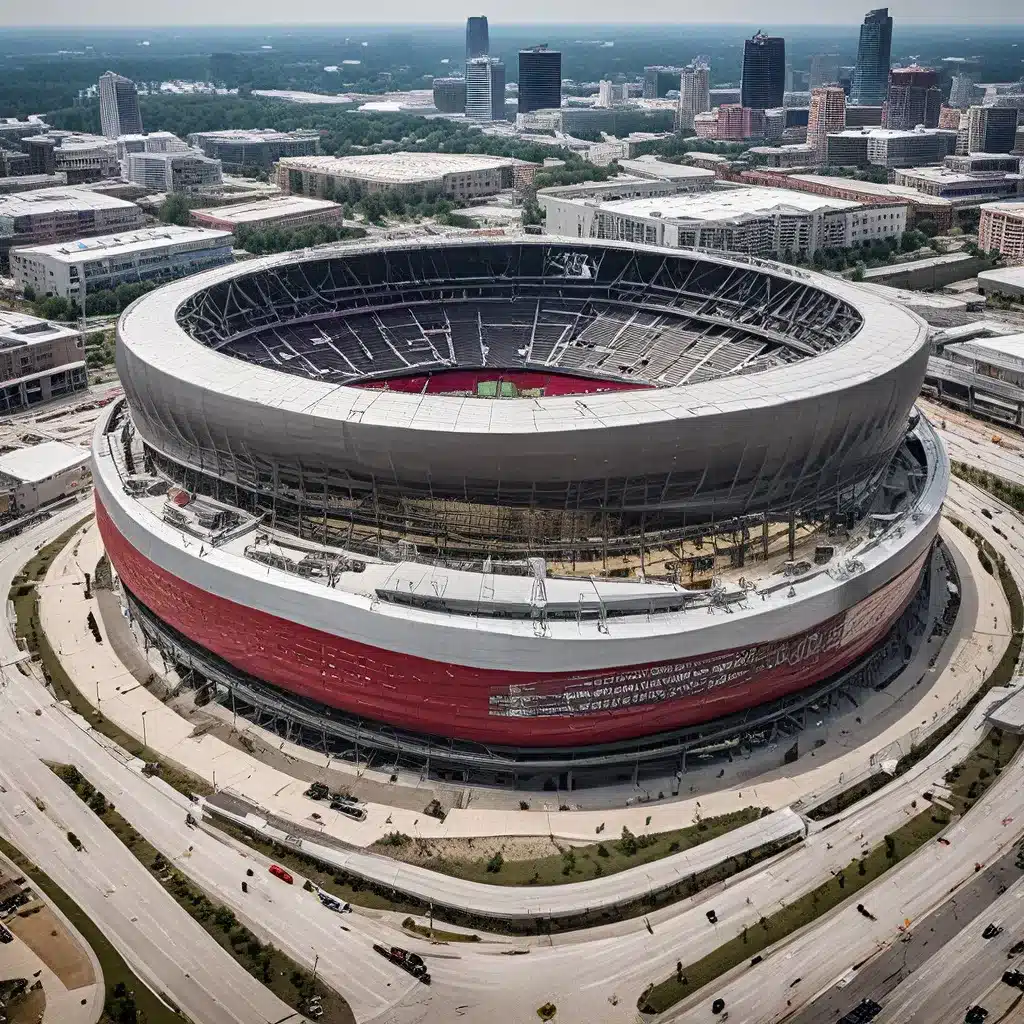
The Mercedes-Benz Stadium in Atlanta, Georgia, stands as a testament to the city’s unwavering commitment to sports and entertainment. This state-of-the-art facility has become an iconic landmark, not just for the state of Georgia, but for the entire nation. From its innovative design to its storied history, the Mercedes-Benz Stadium is a testament to the power of vision, determination, and a passion for excellence.
The Architectural Masterpiece
The Mercedes-Benz Stadium is a architectural marvel that has captured the attention of sports enthusiasts and design aficionados alike. Designed by the renowned firm HOK, the stadium’s striking appearance is both visually stunning and functionally efficient. The most recognizable feature of the stadium is its retractable roof, which can open and close in just 12 minutes, allowing the stadium to host events rain or shine.
The stadium’s unique shape, with its eight-panel retractable roof and triangular facade, was inspired by the geometry of a falcon’s wing. This design not only adds to the stadium’s aesthetic appeal, but also serves a practical purpose by optimizing the airflow and reducing the energy required to cool the facility.
According to the architects at HOK, the stadium’s design was also influenced by the city of Atlanta’s rich history and culture. The use of natural materials, such as wood and stone, combined with the incorporation of local public art, creates a sense of place that is uniquely Atlanta.
A Groundbreaking Venue
The Mercedes-Benz Stadium is not just an architectural marvel; it is also a groundbreaking venue that has transformed the landscape of sports and entertainment in Atlanta. Opened in 2017, the stadium is the home of the Atlanta Falcons of the National Football League (NFL) and the Atlanta United of Major League Soccer (MLS).
One of the most innovative features of the Mercedes-Benz Stadium is its commitment to sustainability. The stadium is the first professional sports venue in the world to achieve LEED Platinum certification, the highest level of environmental sustainability recognized by the U.S. Green Building Council. This designation is a testament to the stadium’s energy-efficient design, water conservation efforts, and commitment to reducing its environmental impact.
The stadium’s sustainable features include a 697,000-square-foot solar panel array, which generates enough power to offset the energy needs of the facility on game days, as well as a unique water reclamation system that captures and reuses rainwater for irrigation and other purposes.
A Hub of Sporting and Cultural Events
The Mercedes-Benz Stadium has quickly become a premier destination for a wide range of sporting and cultural events. In addition to hosting the Atlanta Falcons and Atlanta United, the stadium has also been the site of major events such as the College Football Playoff National Championship, the MLS Cup, and the SEC Championship Game.
The stadium’s event calendar is a testament to its versatility, with a diverse lineup that includes concerts, conventions, and even religious services. The stadium’s state-of-the-art facilities, including its advanced sound system and high-definition video boards, have made it a popular choice for artists and performers looking to deliver an unforgettable experience to their audiences.
One of the most significant events hosted at the Mercedes-Benz Stadium was Super Bowl LIII in 2019. The stadium’s cutting-edge technology and amenities, combined with its convenient location in the heart of Atlanta, made it an ideal choice to host the prestigious NFL championship game. The event was a resounding success, showcasing the stadium’s ability to handle the demands of a global media event and the influx of thousands of fans.
A Symbol of Community and Civic Pride
Beyond its role as a premier sports and entertainment venue, the Mercedes-Benz Stadium has also become a symbol of community and civic pride in Atlanta. The stadium’s impact on the city extends far beyond the boundaries of the facility itself, with the surrounding area experiencing a significant revitalization and economic growth.
The stadium’s commitment to the community is evident in its various outreach programs and initiatives, which aim to positively impact the lives of Atlanta residents. From youth sports clinics and educational workshops to charitable partnerships and volunteer opportunities, the Mercedes-Benz Stadium has become a hub of community engagement and social responsibility.
The stadium’s impact on the local economy has also been significant, with the facility generating thousands of jobs and contributing to the city’s overall economic growth. The stadium’s presence has also helped to attract additional investment and development in the surrounding area, further enhancing the vibrancy and attractiveness of the city.
A Legacy of Excellence
The Mercedes-Benz Stadium’s impact on the city of Atlanta and the broader sporting and entertainment landscape is undeniable. As a cutting-edge facility that combines innovative design, sustainability, and community engagement, the stadium has become a model for other sports and entertainment venues around the world.
The stadium’s legacy will continue to grow as it hosts more world-class events, inspires future generations of architects and engineers, and serves as a source of pride and community for the people of Atlanta. Whether you’re a sports fan, an architecture enthusiast, or simply someone who appreciates the power of civic innovation, the Mercedes-Benz Stadium is a must-visit destination that is sure to leave a lasting impression.

